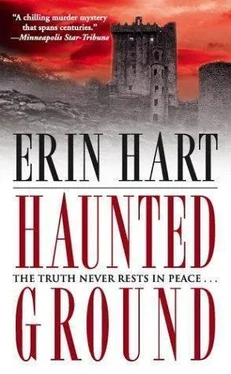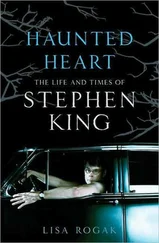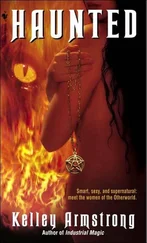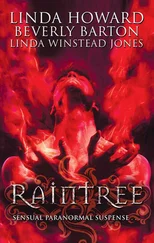Mina offered vividly detailed descriptions of every room at Bracklyn House, no doubt in case her mother would never have the opportunity to visit. She marveled at its age, the comfort of its furnishings, the profusion of books in its library, the sweetness of the roses in the garden. The newly married Mina also painted a glowingly affectionate portrait of Hugh Osborne, and shyly confided to her mother the surprise and delight she found in being married. Devaney felt his face flush as he realized it was an indirect way to tell her mother how much she enjoyed sex. “I’m glad after all that you persuaded me not to join the Sisters of Mercy. I was so keen on it, too. How did you know it wouldn’t be the right thing?”
But if her view of Hugh Osborne was softened by love, she was able to observe other people with a less clouded eye: “Lucy is not the warmest person, I’m afraid, but she’s put on a brave face and is obviously making an effort to get used to me. I sometimes catch her staring, when she thinks I’m not paying attention. I know that my arrival has changed things for her, but I hope one day we may become friends.” Of Jeremy she wrote: “He’s such a sad, beautiful boy that I feel like weeping when I look at him. At times he’s not like a child at all, so serious and thoughtful. But sometimes I also get a feeling he longs to be held and comforted like a child again.”
Subsequent letters contained details about Hugh’s teaching, how her work in the studio was coming along, the progress of the herbs she’d sown in the kitchen garden, the dismal lack of variety in the fruits and vegetables available at the little market in Dunbeg. There was always a lively description of whatever book she was reading at the moment. Devaney was amused by her fond characterization of Father Kinsella: she genuinely liked him and valued their exchange of ideas, especially on spiritual matters, but Mina Osborne was also aware of the effect the handsome young priest had on most of his female parishioners. The picture that emerged from the letters was that of a highly intelligent young woman, acutely observant, and yet somehow completely guileless. She knew so much, saw so much, but remained almost painfully innocent about the motivations of those around her, interpreting their actions as if all shared her open-hearted spirit.
In the first few letters there was scant mention of the child she carried. And only once did she express apprehension about having a child so early in the marriage, before she and Hugh had come to know one another sufficiently. But as the pregnancy progressed, Mina began to provide her mother with more regular updates on doctor visits, and marked how her own enthusiasm and energy for painting and letter-writing seemed to flag.
“I sometimes feel quite depressed when I don’t have the inclination or the energy to work,” she wrote. “But then I consider the millions of cells dividing inside me, and I think that nurturing a new life is one of the supreme acts of human creativity.”
Devaney tried to keep in mind that he was looking at Mina Osborne’s life in a drastically telescoped, condensed fashion, and also through the medium of letters, which could lead to a somewhat heightened impression of reality. He found a noticeable gap in the letters from just before Christopher was born to about six weeks after. No doubt learning to care for a newborn left little time for the kind of expansive letters Mina was used to writing, but he made a note to ask the mother if they’d had contact by phone during that time, or if there really had been no communication at all.
The next letter contained photographs, fuzzy close-up shots of the tiny newborn Christopher, all wispy curls, plump cheeks, and tiny slits of bright, dark eyes. Mina acknowledged her long silence, and promised she would not neglect letter-writing again. She described the surreal days and nights following her son’s birth, the blur of feedings, the sudden seesaw between wakefulness and fatigue, and the intensely physical experience of motherhood.
Mina’s letters began to grow more relaxed again as the weeks went by, as she and the baby got used to one another. Her husband’s presence began to fade ever so slightly into the background, details about his academic work displaced now by Christopher’s exploits, the walks Mina took with him in the pram. Hugh occasionally stayed late in Galway to work, a thing that seemed to disturb her somewhat. Ordinary adjustments, Devaney thought. Jeremy began to have a larger role in her letters as well, growing curious about the baby, and becoming involved in his care. “He’s very gentle,” Mina wrote, “and looks so sweet holding Christopher with a nappy over his shoulder.” Devaney tried to picture this from what he’d seen of the boy, and had trouble conjuring the image in his mind. Jeremy would have been what age then? About fourteen, he reckoned. Christopher’s sitting up on his own, his first tooth, his first steps were all documented in the letters, along with photos showing him asleep in his cot, long dark lashes lying like shadows on his cheeks. There was nothing so far that seemed remotely disturbing or out of balance. Hugh Osborne was only mentioned in the most loving terms. In one letter there was mention of a dust-up about Jeremy going to Mass with Mina. From what she said, Devaney gathered that the boy’s mother didn’t approve and had evidently put a stop to it. Later missives confirmed what Kinsella had said, that Mina was anxious to reconcile with her father. The separation from home and family seemed to weigh upon her more heavily as Christopher grew.
It was nearly five o’clock when Devaney reached the last few letters; there was a note clipped to the last two: “Received these after October 3.” That meant Mina mailed them just before she disappeared. Devaney opened the first one and read the now familiar hand, searching for some hint, some trace of information in the words, or between the lines, but all he found was astonishment about the rate at which Christopher had grown, a mention of Hugh leaving for a conference in Oxford, and Mina’s hopeful spirit continuing to press toward reconciliation with her father.
“The subject of our visit remains under discussion. Hugh still thinks it would be ill-advised, but he doesn’t know Pa. You and I know Papa’s secret, that he’s not really the hard man he pretends to be. How could the embrace of our beautiful, innocent child not change his heart?”
Devaney slipped the last letter back into its envelope. Did she not have a clue what people in the town were whispering about her husband and Una McGann? He supposed she could have been ignorant of the town’s idle gossip. Or simply unwilling to discuss such a subject with her mother. There was not enough in these letters to implicate Osborne as a suspect, nor anything to suggest Mina Osborne had simply run off.
It was only then that Devaney recalled the telephone ringing during the meal. He picked up the receiver and heard the broken signal indicating a waiting message. The call had not been for the children after all, but for him: Dr. Gavin, with news that she and Maguire had found something that might be of interest, and asking him to ring back. Fucking hell. He’d told them to ring at any time.
Devaney looked at the letters and photographs stacked on the table before him. As he gathered them into the envelope, and climbed the stairs toward his bed, he contemplated the lightness, the seeming insignificance of this small package that held a few scant remains of Mina Osborne’s earthly existence.
He snapped awake when the phone rang. It was still dark, and he heard Nuala answer from her side of the bed. “Yes, he’s here,” she told the caller. His first thought was that it might be Dr. Gavin, but it was Brian Boylan’s voice on the line.
Читать дальше











